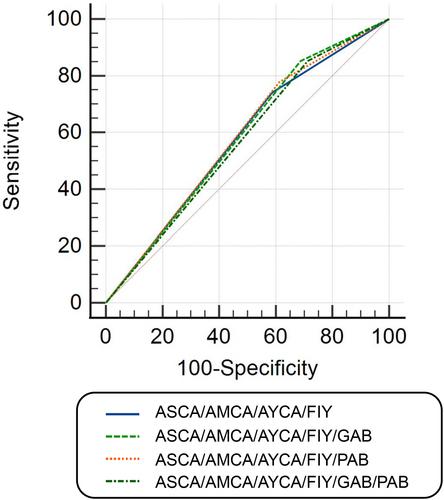Clinical validation of serum immunosignatures in early diagnosis of Crohn's disease
Abstract
Background
The search for biomarkers suitable for early diagnosis of Crohn's disease (CD) is challenging. This study investigated the efficacy of serological markers for the early diagnosis of CD.
Methods
This was a retrospective nested cohort study. Indirect immunofluorescence and enzyme-linked immunosorbent assay were used to detect ASCA IgG, ASCA IgA, AYMA IgG, AYCA IgG, FI2Y IgG, p-ANCA IgG, GAB IgG and PAB IgG in patient serum samples.
Results
The positive rates of ASCA IgG, ASCA IgA, AYMA IgG, AYCA IgG, FI2Y IgG, p-ANCA IgG, GAB IgG and PAB IgG in patients with early CD, advanced CD and other intestinal diseases were 37.0% versus 56.8% versus 27.8%; 3.7% versus 20.5% versus 19.4%; 14.8% versus 2.3% versus 2.8%; 25.9% versus 9.1% versus 8.3%; 18.5% versus 15.9% versus 8.3%; 0.0% versus 2.8%, 18.5%; 13.6% versus 18.2% versus 16.7%; and 7.4% versus 20.5% versus 0.0%, respectively. The positive rates of ASCA IgG, AYCA IgG and PAB IgG were significantly different among the three groups (p < 0.05). In 85.2% of early CD patients, at least one antibody was detected 1 year before diagnosis. The sensitivity of the ASCA/AYMA/AYCA/FI2Y/GAB combination for early diagnosis was 85.2%. The sensitivity of the ASCA/AYMA/AYCA/FI2Y/GAB/PAB/PANCA combination for differentiating CD from other diseases was 87.3%.
Conclusions
ASCA IgG and AYCA IgG have potential value in identifying the course of CD. AYCA IgG may be a potential marker for the early diagnosis of CD, and ASCA IgG indicates an advanced stage. The combination of ASCA, AYMA, AYCA, FI2Y, and GAB improves early diagnostic accuracy of CD.


 求助内容:
求助内容: 应助结果提醒方式:
应助结果提醒方式:


